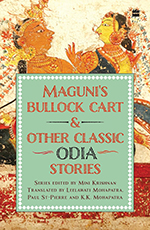At first glance, Maguni’s Bullock Cart & Other Classic Odia Stories appears to offer very little to the present-day reader. Its world feels distant and its concerns seemingly remote from contemporary experience. And yet, like Maguni’s own bullock cart, leisurely rumbling down the winding lanes of Khallikote, the collection gradually reveals its quaint charm. The last time HarperCollins brought out the Book of Oriya Short Stories in 1999, it coincided with the centenary celebration of the Odia short story. This year, with Maguni’s Bullock Cart & Other Classic Odia Stories, no commemorative gong is struck. Still, the collection gently steers the reader to the first 50 years (1898-1945) of the genre, casting a warm light on tales both masterly and flawed.
Bringing this distant world to the contemporary reader is the seasoned translator trio of Leelawati and KK Mohapatra, and Paul St-Pierre who previously curated The Greatest Odia Stories Ever Told (2019) and have collaborated on the English translations of many iconic Odia novels. Joining the trio as editor is the redoubtable Mini Krishnan, often regarded as the invisible architect of India’s translation renaissance. The book is part of HarperCollins’s Classic Stories series being brought out across Indian languages. In her Note on the series, Krishnan explains that it was conceived as a way of honouring the foundational figures of modern Indian literature. The idea was to showcase writers who, though not all widely celebrated or remembered today, helped shape the trajectory of Indian storytelling. While their contributions may not always be classified as timeless, their influence in ‘terms of tastes, styles, experiments and themes’ (p. x) is undeniable. Maguni’s Bullock Cart encapsulates this vision by including not only the representative stories but the whole kit and caboodle that together capture the pulse and promise of the Odia short story in its earliest stirrings.

